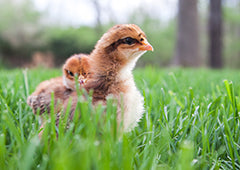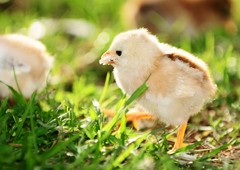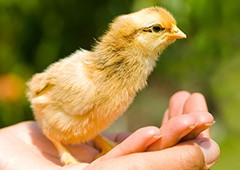It's finally time to watch your little miracles come to life and break into the big wide world. The hatching process is hugely responsible for the biological development of a newborn chick, so try not to let your soft side take over and break that shell open for them! It may look like they're struggling, but there are very powerful forces at play during this wonderful event.
Here are 5 top tips to follow during hatching day.
1: Don’t help them out of their egg
The act of breaking out of the hatch is crucial for strengthening and providing the foundations for the chicks' muscles. If you immediately scramble to crack open their shells at the first sign of life, their physical health will deteriorate quickly as their muscles have not developed as needed. Also, it's crucial that the chick has absorbed all the blood that's stored in the membrane of the shell, otherwise they are at risk of serious health issues - think hemorrhaging, ruptured blood vessels, nasty problems that will seriously impede the chicks life (and possibly shorten it). Best to limit involvement to cheering on the sidelines instead.
2: Don’t remove the egg shell
Chicks must consume the membrane found in the egg shell in order to get the nutrients they need to kick start their healthy lives. If you remove the shells before they are able to consume the eggs, this will do severe damage to the chick and their immune system. Breakfast is the most important meal of their first day!
3. Don't worry if it loses a tooth
If your alarmed by the fact that all your newborn chicks seem to be dropping teeth like flies, don't be - this is a very normal post-hatching mechanism. This is simply the egg-tooth, the little white nub that sits on the end of the chick's beak. It's used for initially cracking open the shell and giving the chick its first taste of freedom! It will always drop off a few hours after birth as it is no longer has a purpose. Pretty nifty!
4: Don't feed the empty shells to your hens
It might be tempting to throw the shells in with the scraps for your hens to gobble up like normal, but this is definitely a sure fire way to end up in the vet surgery. The recently vacated shells contain a wealth of bad bacteria, and can make your older flock extremely sick if they manage to consume them. Dispose of the shells out of reach from all beaks and feathers, and make sure you scrub your own hands squeaky clean!
5: Don't panic!
Hatching is a complex process in which a whirlwind of wonderful, essential things need to happen to give your chicks the best start. Don't start to fret if things aren't moving along as fast as you'd anticipated - the process is complex and therefore can be quite a lengthy one. A normal hatch takes around 24 hours, but large babies and breeds can take up to 48. Keep calm and hatch some chickens.
6: Don't despair
It's a harsh reality that not all of your chicks may make it to the hatching phase. There will inevitably be some eggs that show no signs of life, and have unfortunately passed away during the incubation process. Please remember that this is a very natural part of life, and its rare for 100% of eggs to hatch into newborns.
Hatching day is one of the most exciting parts of owning chickens - you have the privilege of witnessing the miracle of new life, and its all thanks to you! There are no words to describe the moment you hear their first little cheeps - it's a truly magical experience that you’ll never forget.
Preparation is key for a successful hatching day. A good incubator and brooder will be your best friends through this sometimes emotional time. There is a very exciting journey ahead of you so make sure you've done your research in terms of everything you need to know when it comes to raising baby chickens.
There is so much to learn and prepare before helping to bring new life into the world. It can be a joyful and eggstraordinary experience for the whole family. Nothing compares to seeing fluffy little hatchlings peck out of their shells. Getting to this perfect moment does come with a fair few challenges and risks which can be stressful and overwhelming, especially without the right information.
This is why I recommend our friends at Chickenpedia. They have created the brilliant Hatch A Plan course to help you successfully incubate and hatch happy and healthy chicks. Their course offers valuable advice to ensure you build your knowledge to avoid tragic disasters, as these little ones can be so sensitive to temperature! You can learn about the conditions and equipment needed to confidently bring new life into the world.
We all know just how quickly these little ones grow up so you are going to want to make sure that you've got the knowledge you need to raise a happy, healthy flock. You wouldn't want to risk making tragic mistakes that could impact their development, growth or worse! 67% of chicken keepers surveyed experienced a chicken health or behaviour issue in the first 12 months that they didn’t know how to handle.
Cluckily, Chickenpedia also has a Raising Baby Chicks course that provides lots of useful information to help you avoid any life-threatening accident. You'll have new confidence to give your feathered friends the best start in life.
From raising baby chicks to feeding and behavior, you’ll find beginner-friendly courses that’ll give you the knowledge and confidence to successfully look after your chickens for years to come. Chickenpedia's courses are exclusive to members only, so get access today!

















